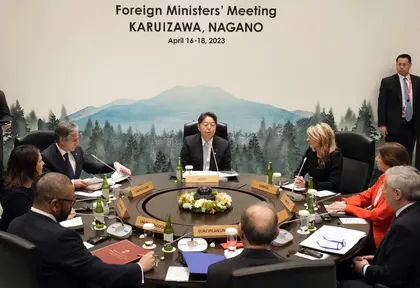G7 foreign ministers warned Tuesday that those helping Russia wage war in Ukraine would face strong consequences.
JOIN US ON TELEGRAM
Follow our coverage of the war on the @Kyivpost_official.
The diplomats from Japan, Britain, the United States, Canada, Germany, Italy, France and the European Union promised to continue “intensifying” sanctions on Russia and increase efforts to respond to those offering Moscow arms or other support, warning of “severe costs.”
“There can be no impunity for war crimes and other atrocities such as Russia's attacks against civilians and critical civilian infrastructure,” the ministers wrote in an official memo.
However, the representatives of the world’s leading economies announced no new sanctions on Moscow over its invasion of Ukraine, or on those helping Russia evade current measures and acquire weapons. Two issues dominated G7 discussions: the war in Ukraine and China's growing role and threatening maneuvers around Taiwan.
The G7 also slammed Russia's “irresponsible nuclear rhetoric” and called a threat by Moscow to deploy nuclear weapons in Belarus “unacceptable.”
The statement made clear the ministers were mindful of the furore caused by French President Emmanuel Macron's comments last week, following a trip to Beijing, that Europe should avoid "crises that aren't ours".
"There is no change in the basic positions of the G7 members on Taiwan," the final statement said, calling peace and stability in the Taiwan Strait "indispensable" to global security and prosperity.

Eurotopics: Who Can Ukraine Count on in 2025?
"For the first time in G7 history, we were able to confirm, in writing, our commitment to a free and open international order based on the rule of law," Japan's Foreign Minister Yoshimasa Hayashi said.
Blinken said he had never seen "greater convergence" on views about China and Taiwan, and the statement warned Beijing on everything from its nuclear arsenal to its business practices, AFP reports.
It accused China of an "ongoing and accelerating expansion of its nuclear arsenal", and expressed concern Beijing is developing "increasingly sophisticated delivery systems, without transparency, good faith arms control or risk reductions measures".
And, without directly mentioning China, the group pledged to step up cooperation against "economic coercion" -- the practice of weaponizing import or export rules for political purposes.
Even the warning on offering support to Russia in Ukraine may be read as a message for China, echoing repeated statements from Western officials cautioning Beijing against directly arming Moscow.
While talks were dominated by Ukraine and regional challenges, including a demand that North Korea "refrain" from new nuclear tests or ballistic missile launches, the ministers covered a broad sweep of global policy problems.
They met as fighting continued in Sudan between the army and paramilitaries, forcing the insertion of last-minute language demanding both sides "end hostilities immediately without pre-conditions".
And there was renewed condemnation of the increasing restrictions placed on women and minorities by Taliban authorities in Afghanistan, described by the ministers as "systematic abuses".
They demanded the "immediate reversal" of "unacceptable decisions" including a ban on women working with non-government organisations and the United Nations in the country.
You can also highlight the text and press Ctrl + Enter






